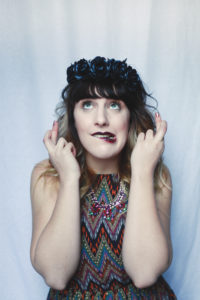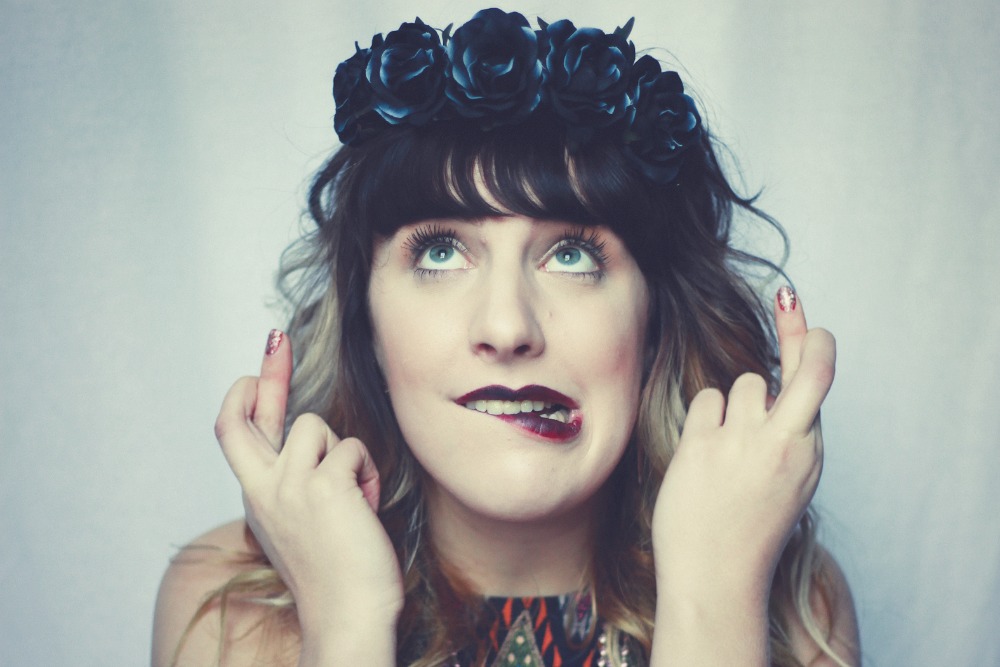At sixteen, my best friend and I started a band. We were two quiet, nerdy, never been kissed teenagers who wanted desperately to have an adventure. Though we technically lived in the retirement town of White Rock, British Columbia, we spent most of our time in our own world… a world that from an outsider’s point of view could only be described as “very cute”.
So it only made sense that our band sang songs about liking boys and being nerds, and our logo was a hand drawn cupcake. That band became my persona. I was Sarah from The Oh Wells, and I was cute, cute, very cute. Sure, I’d been having panic attacks and insomnia since I was four years old, but even my anxiety came off as endearing.
The year I turned twenty, my band competed in a prestigious music competition. The other musicians all saw me as the shy, quirky, adorable one. Nobody knew that I had been fighting uncontrollable mood swings and suicidal thoughts for the past year and a half, that my behaviour had pushed away my band mates and my best friend, and that I had never felt more alone in my life.
I so badly wanted to be the happy girl baking cupcakes that was on my album cover. She was still a part of me, but the other part of me was crying for help, and I was ignoring her. I tried every natural remedy, therapist, diet, and eastern religion that I came across, but that other part of me would never leave me alone for good. She would pop up just when things were getting good, and leave me rocking back and forth in my room.
Finally, I stepped away from the band and faced my mental illness. I accepted my diagnosis of Bipolar Type 2, and I started the horrible trial-and-error of finding the right medication. As each drug failed to control my symptoms or presented even worse side effects, I often felt like giving up. My suicidal thoughts became the loudest thoughts in my head. I experimented with overdosing on a daily basis.
One day, I told one of my closest friends how many pills I had taken. It was more than ever before. She called 911 and as I drifted into a pill-fuelled daze, I heard police officers at my door. I now know, after a few of these types of incidents, that if a police officer shows up at your door, you should just do what they say. But at this point, I was terrified. They chased me as I tried to run away, screaming, and took me to emergency.
Hours later, I shuffled to the bathroom, sedated and numb. As I was washing my hands, I was struck by my reflection in the mirror. I couldn’t recognize the girl looking back at me. She was in a skimpy hospital gown, greasy hair standing almost on end, cheeks raw from crying and lips grey from dehydration. I looked like a stereotypical crazy person, like something out of a movie. I had never looked less cute in my life. Back at my hospital bed, my friend was waiting for me, desperately asking the nurses to bring me a sandwich. It’s important for me to say: I wasn’t cute, but I wasn’t alone either.
I’m twenty-five now. That wasn’t my last hospital visit, but it was the last time that I was startled by my own darkness. Now I embrace every part of me (or try to). I’ve repaired lost friendships, rekindled relationships torn apart by my unpredictability, and only a month and a half ago I finally found a cocktail of medications that keep me stable and safe. I’ve starting playing music again, and this time I write about the darkest parts of my life and hold nothing back. But the truth is I still have that part of me that loves paper hearts and the sound of the marimba.
I recently created a music video for my new song “Valentine,” a love letter I wrote to those who stood by my side through the ups and downs. In the video, I wanted to compare that cute girl who started a band when she was sixteen with the girl I saw in the mirror at the hospital, and I wanted to show everyone that they are both ME. I am a musician in her mid-twenties who lives with bipolar disorder. Sometimes I feel empty and sometimes I feel full of joy. This music video shows the extreme opposites of bipolar, and the importance of accepting the dark along with the light.
Valentine (Official Video) – Sarah Jickling and her Good Bad Luck
About the Author: Sarah Jickling
 Sarah Jickling is a Canadian songstress and mental health advocate. Over the past few years, Jickling’s whimsical indie-pop songs have been featured on radio stations across the country and in independent films. The twenty-five year old uses her music to spread mental health awareness, and has opened up about her experiences with Bipolar Disorder and Anxiety Disorder on radio, local television, podcasts, blogs and at live speaking events. Her new album, When I Get Better, is set to be released in 2017. She can be found in hospital waiting rooms and pole dancing studios around Vancouver, BC.
Sarah Jickling is a Canadian songstress and mental health advocate. Over the past few years, Jickling’s whimsical indie-pop songs have been featured on radio stations across the country and in independent films. The twenty-five year old uses her music to spread mental health awareness, and has opened up about her experiences with Bipolar Disorder and Anxiety Disorder on radio, local television, podcasts, blogs and at live speaking events. Her new album, When I Get Better, is set to be released in 2017. She can be found in hospital waiting rooms and pole dancing studios around Vancouver, BC.
[irp posts=”2156″ name=”Bipolar Disorder – Important New Insights”]
[irp posts=”2049″ name=”Dealing with Depression: 14 NEW Insights That Will Change the Way You Think About It”]



Leave a Reply